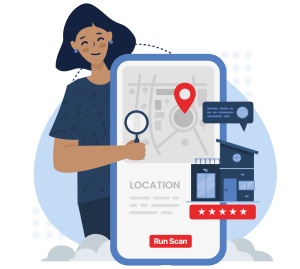Local search visibility is changing fast and it's not just about ranking in the Google 3-Pack anymore. Now, you also have to think about how your business shows up in Apple Maps, Google's AI Overviews, ChatGPT responses, and other AI-powered assistants.
If you're not tracking your rankings for the right local keywords in both traditional local search and AI search, you could be losing visibility to competitors without realizing it.
This guide will walk you step-by-step through how to:
-
Find the right local keywords to track for both traditional and AI search.
-
Set up geo-grid rank tracking for local keywords so you can see exactly where you stand across your service area.
-
Spot opportunities to improve your visibility in Google Business Profile, Apple Business Connect, and emerging AI platforms.
Follow These Steps To Find Keywords To Track and Boost Rankings for Local Keywords
Step 1: Identify the Keywords to Track
Before you can track your local rankings, you need a strong keyword list. Here, you're looking for keywords that trigger local pack results, Apple Maps listings, or AI-driven local recommendations.
Start with your business listing categories
-
Check your Google Business Profile and Apple Business Connect categories. These often make great starting keywords to build off of.
-
For example, if your category is "plumber," you might also track "emergency plumber" or "water heater repair."
Look at your competitors
-
Find top local competitors and note any categories or services they list that you don't. If relevant, add them to your profile and keyword list.
Use geo-modifiers
-
Add city, neighborhood, or district names to your base keywords (these are known as geo-modifiers).
-
For example: "pizzeria Mile End" or "teeth whitening Lincoln Park."
Save hours with Local Falcon's Local Keyword Tool
Local Falcon's AI-powered Local Keyword Tool finds keywords people are using to discover your business in both:
-
Traditional local search (Google Search and Maps, Bing, Apple Maps)
-
AI search visibility tools (Google AI Overviews, ChatGPT, and more)
You can instantly pull targeted, hyperlocal keyword suggestions based on your categories, service area, and real-world search behavior, with no guesswork required. Then, you're just a click away from adding them to a local keyword rank tracking scan!
Step 2: Set Up Local Rank Tracking
Once you have your keywords, it's time to track them across your local area with Local Falcon's signature geo-grid rank trackin technology.
It's important to understand that searching for your own business on Google or Apple Maps from your computer won't give you an accurate picture, since search results vary dramatically by location, even just a few blocks apart. That's why you need a geo-grid rank tracker for local keywords.
Local Falcon's geo-grid scans let you:
-
See your rankings across a visual map of your area.
-
Track your precise visibility at each point for each keyword.
-
Compare side-by-side with your competitors.
Pro tip: Choose a grid size and radius that covers your actual service area (and maybe a bit beyond) to see potential expansion opportunities, taking advantage of Local Falcon's flexible grid points to disable irrelevant data points, such as those over bodies of water.
Step 3: Run Your First Scan
In Local Falcon:
-
Select your business location.
-
Add your chosen keywords.
-
Pick your scan radius and grid size.
-
Choose which data source to track (Google Business Profile, Apple Business Connect, or one of the available AI sources).
-
Hit Run Scan.
Within minutes, you'll have a map showing your rankings for each keyword across your entire local area.
Alternatively, you can instantly run a Quick Scan or set up an ongoing local keyword rank tracking Campaign from the Local Keyword Tool, drastically streamlining the process.
Step 4: Analyze Your Results
Your scan results will reveal:
-
Green zones where you rank at or near the top.
-
Yellow/orange zones where you're close to the top but could improve.
-
Red zones where you're not visible (yet).
For AI visibility scans, you'll see where your business appears in Google AI Overviews, ChatGPT, and other AI search assistants. This can provide a significant competitive advantage, since most businesses aren't tracking AI visibility at all yet.
Step 5: Take Action Based on Data
Your keyword rank tracking doesn't just let you know where you rank, it guides you on what to do next.
If you see underperforming areas for Google Business Profile:
-
Add or adjust business categories and services.
-
Fix missing or inaccurate information.
- Get more reviews and use Local Falcon's Reviews Analysis Tool to analyze and improve reviews.
For AI visibility:
-
Make sure your business info is accurate, complete, and up to date across the web.
-
Create content that answers the kinds of questions that users are prompting AI with.
-
Build topical authority around your main service categories.
Step 6: Keep Monitoring & Adapting
Local search, especially now that AI search is in the picture, changes quickly. To kepp up:
-
Run scans regularly (ideally weekly or bi-weekly) to monitor your performance and spot trends.
-
Use Local Falcon's Campaign Scans to schedule recurring scans and automate this process.
-
Add new keywords from the Local Keyword Tool to Campaigns as you discover new opportunities.
Final Words
Rank tracking for local keywords gives you the insights you need to stay ahead in both traditional and AI-driven search.
With Local Falcon's Local Keyword Tool and advanced geo-grid tracking for Google Business Profile, Apple Business Connect, and AI visibility, you can see exactly where you stand today and where you could win more tomorrow.
Try building a keyword list in the Local Keyword Tool and start tracking now to see the full picture of both your traditional local search and AI visibility.


